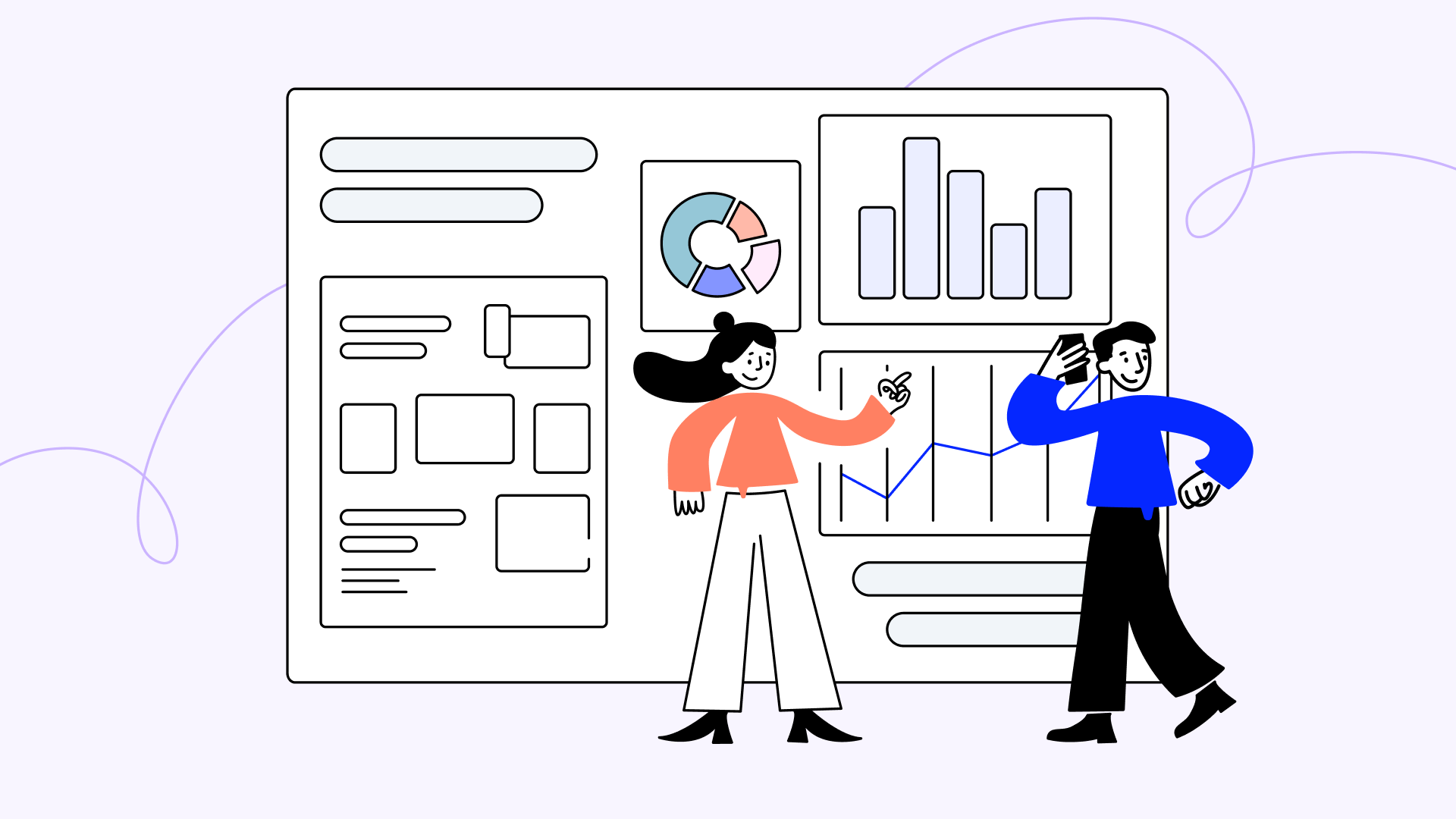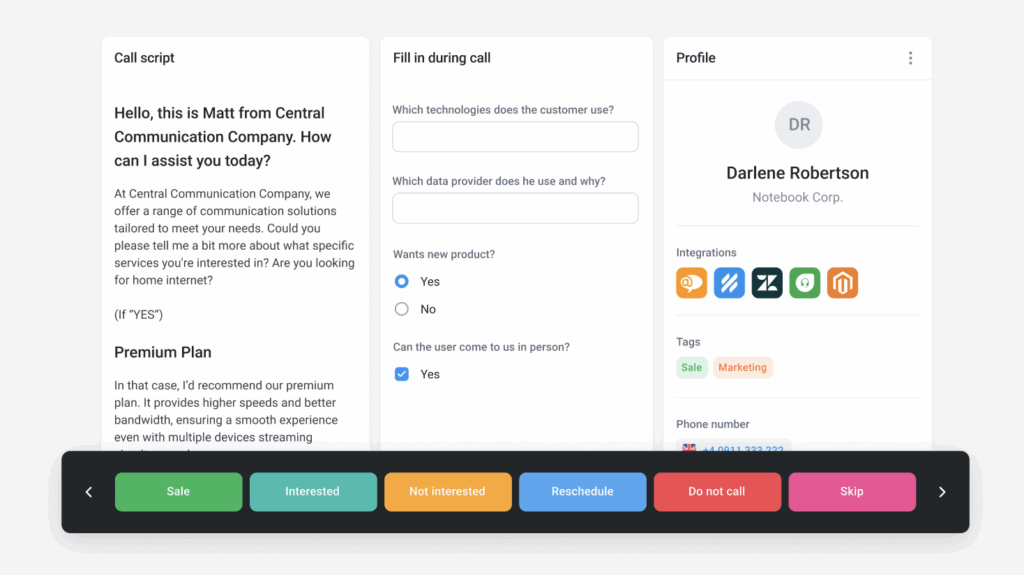What is Outbound Calling: Your Complete Guide

82% of buyers say they’ll meet with reps who reach out first. That’s the power of outbound calls.
An outbound call is when your team initiates a call to a customer or prospect—usually for sales, marketing, or follow-ups. Unlike inbound calls, which come to you, outbound calls put you in control of the conversation.
They’re essential for lead generation, sales outreach, and re-engagement.
Key takeaways:
- With outbound calling, your team initiates the call—usually for sales, follow-ups, or marketing—not the customer.
- Common in B2B sales, outbound call centers, customer check-ins, and non-profit fundraising.
- 69% of buyers have accepted cold calls from sales representatives in the past year, demonstrating the continued effectiveness of outbound calling in engaging prospects.
What is an Outbound Call?
An outbound call is a phone call initiated by a business or contact center agent to reach customers, prospects, or other individuals. Unlike inbound calls—which are received by the business—outbound calls are made by the company to achieve specific goals such as sales, lead generation, telemarketing, customer support, fundraising, or survey collection.
Curious how outbound calling actually works in real teams?
Inbound vs Outbound Calls: What’s the Difference?
The core difference between inbound and outbound calls lies in who initiates the conversation. In outbound calls, the business contacts the customer—typically to generate leads, close sales, or conduct outreach campaigns. In inbound calls, it’s the customer who reaches out, usually to ask a question, resolve an issue, or get support.
For example, a sales team might place outbound calls to pitch a new product to leads, while a support team might handle inbound calls from customers needing help with billing or technical issues.
Both are critical touchpoints—but they serve very different goals.
Feature
Inbound Calls
Outbound Calls
Who initiates the call
Customer
Business or call center agent
Typical purpose
Customer support, inquiries, complaints
Sales, lead generation, follow-ups, surveys
Call center role
Handle and resolve incoming requests
Reach out proactively to contacts
Tools involved
IVR systems, ticketing, CRM
Auto-dialers, CRM, call scripts
Team type
Support teams, customer service reps
Sales reps, telemarketers, fundraising teams
Main goal
Improve customer experience and satisfaction
Drive revenue, collect data, increase outreach
Different Types of Outbound Calls
Outbound calling isn’t just for sales—it’s used across departments to drive engagement, gather insight, and build long-term customer relationships. Here are some of the most common types of outbound calls and what they’re used for:
Sales Calls
Outbound sales calls remain a cornerstone of many revenue teams. They typically fall into two categories:
- Prospecting calls (cold or warm) to generate new business
- Customer calls for upselling or cross-selling
According to HubSpot’s 2024 Sales Trends Report:
- 63% of sales professionals conduct cold outreach.
- 37% of sales representatives produce the most leads from phone calls during cold outreach.
If your team needs help getting started, sales call script templates are a great way to save time, stay on message, and boost confidence on every call.
Marketing Calls
Marketing calls often focus on qualifying leads rather than closing deals. These could involve checking interest levels, clarifying needs, or gathering context for future outreach.
These calls lay the groundwork for conversion—and help sales teams prioritize the most promising prospects.
Market Research Calls
Outbound calling is a fast, direct way to collect customer feedback or test new messaging. Research calls help businesses better understand customer needs, identify pain points, and shape product or service improvements.
Just be mindful of audience segmentation—some groups respond better than others.
Proactive Customer Service Calls
These are made to preempt issues or provide helpful updates—before customers reach out themselves. Think: upcoming service interruptions, product changes, or follow-up after a support ticket.
Handled well, proactive support calls can build trust and reduce churn. Just keep them relevant—no one wants a phone call for every minor update.
Appointment Scheduling Calls
These outbound calls are used to book, confirm, or reschedule appointments, commonly in healthcare, legal, real estate, and service-based industries. They help ensure clients show up, reduce missed bookings, and improve operational efficiency.
Collections Calls
Collections calls are made to recover overdue payments or remind customers about outstanding balances. These calls require a careful balance of professionalism, empathy, and legal compliance—often handled by dedicated agents or third-party providers. Prewritten scripts are a great way to handle these calls with empathy and diplomacy.
Benefits of Outbound Calling
An effective outbound call strategy does more than just connect you with leads—it actively drives growth, deepens customer relationships, and supports long-term success. Here are the top benefits of outbound calling for modern businesses:
- Drive Lead Generation and Qualification: With outbound sales outreach, your team can proactively connect with prospects, qualify them in real time, and build a strong, predictable sales pipeline. This helps focus efforts on high-intent leads—boosting both efficiency and conversion rates.
- Enable Personalized, Direct Communication: Outbound calls offer the chance to tailor conversations based on each contact’s needs, pain points, or past interactions. Whether you’re using an agent or automated outbound calling tools, this level of personalization strengthens trust and improves the overall customer experience.
- Increase Sales and Revenue: An outbound call center can directly influence purchasing decisions by introducing products, handling objections, and closing deals. These timely, one-on-one conversations are powerful for upselling, cross-selling, and accelerating the sales cycle.
- Achieve Cost-Effective Customer Engagement: Compared to in-person outreach, outbound calling is a scalable, lower-cost way to connect with large segments of your audience. It’s particularly effective for customer retention, renewals, and loyalty-building—without straining your budget.
- Accelerate Market Research & Feedback Collection: Need fast customer insights? Outbound calls allow teams to gather valuable feedback, test new ideas, or validate market trends quickly—ideal for agile decision-making and product innovation.
- Strengthen Customer Retention: Preemptive, personalized check-ins show customers they’re valued—before problems occur. This proactive approach reduces churn, strengthens relationships, and positions your brand as attentive and reliable.
Ready to reach more contacts and improve your team’s efficiency?
Best Practices for Effective Outbound Calling
To maximize the impact of your outbound calling campaigns, it’s essential to combine smart preparation with the right tools—while ensuring your practices align with current regulations. Whether you’re scaling an outbound call center or improving a small team’s efficiency, these strategies will help optimize every call.
Craft Effective Sales Scripts
An effective outbound call script provides structure and clarity for every interaction. It guides outbound call agents in delivering value-driven messaging, handling objections, and adapting in real time—while reinforcing your brand’s tone and goals. Every strong script is built around a clear outbound call definition: initiate meaningful conversations that move leads closer to conversion.
Plan Your Call Flow
Establish clear goals—lead generation, product promotion, retention, or surveys—before dialing. A well-defined outbound call strategy ensures every interaction supports broader business objectives and improves team focus and consistency.
Leverage CRM Systems
Integrating your outbound efforts with a CRM enhances personalization and call relevance. Accessing real-time customer data—past behavior, interests, and support history—lets your outbound call agents deliver smarter, more targeted outreach.
CloudTalk offers extensive integrations, including Salesforce, Pipedrive, Hubspot, and Zendesk.
Implement Auto Dialers
Using an outbound call dialer automates the dialing process and boosts productivity by eliminating manual call setup. With outbound automated calling, your team can maintain high call volumes while focusing on quality conversations with the right leads at the right time.
Utilize Call Analytics
Outbound call analytics provide deep insight into performance—tracking success rates, call durations, engagement trends, and agent efficiency. Use these metrics to fine-tune scripts, adjust training, and strengthen your outbound call center’s overall effectiveness.
Ensure Legal Compliance
Compliant outbound calling is non-negotiable. Follow laws like HIPAA, TCPA, GDPR, and local DNC regulations to protect customer privacy. Keep do-not-call lists updated and ensure consent is logged before launching any outbound automated calling campaigns.
Essential Outbound Calling Tools to Boost Performance
The right technology can make or break your outbound call center strategy. From automating workflows to tracking performance in real time, these tools empower agents, increase productivity, and elevate the customer experience. Here are the must-have tools to drive outbound call success:
Power Dialer
A power dialer automates the dialing process, enabling agents to move quickly from one live conversation to the next without manual effort. It reduces downtime, increases call volume, and ensures your team spends more time speaking with prospects—not waiting for the phone to ring.

Parallel Dialer
A parallel dialer calls multiple numbers simultaneously and connects the agent to the first person who answers. It’s perfect for aggressive lead generation teams who need to maximize talk time and minimize wait time.
Progressive Dialer
A progressive dialer only dials the next number once the agent is available and ready. This balances efficiency and personalization—ideal for teams focused on quality interactions without overwhelming agents.
Smart Dialer
A smart dialer uses data and behavior patterns to prioritize who to call next. It factors in things like lead score, call history, and CRM status to help agents connect with the right contact at the right time.

Outbound Call Analytics
Outbound call analytics provide real-time insight into agent performance, call outcomes, connection rates, and campaign ROI. With this data, managers can optimize scripts, coaching, and overall strategy to ensure each outbound effort delivers measurable results.
CRM Integration
Connecting your outbound call software to a CRM unlocks deeper personalization and more efficient lead management. Agents can instantly view customer history, preferences, and past interactions—making every call more relevant and productive.
Automated Call Workflows
Streamline your outbound calling campaigns with automated workflows—like voicemail drop, scheduled callbacks, and call tagging. These features ensure consistent outreach, reduce repetitive tasks, and help agents stay focused on what matters: quality conversations.
Want to turn more cold calls into conversions? Discover the tools and strategies top teams use.
How to Choose the Right Outbound Call Center Software
Not all outbound calling tools are built the same. Whether you’re a small team or scaling fast, the right software should align with your goals, budget, and workflow. Here’s what to look for when choosing the best outbound call center software for your business:
Transparent Pricing That Scales
Look for software with clear, flexible pricing that scales with your team. You’ll want a plan that supports your current volume—while giving you room to grow without hidden costs.
Seamless CRM and Tool Integrations
The best tools work with what you already use. Choose outbound calling software that integrates with your CRM, helpdesk, and marketing stack—so your agents can stay productive and your data stays in sync.
Built-In Analytics, Reporting & Call Recording
Advanced call analytics and real-time reporting dashboards are essential for tracking KPIs, agent performance, and call outcomes. Paired with call recording, they help you optimize scripts, train smarter, and stay compliant.
Powerful Dialers & Scalability Features
Need to boost call volume without burning out agents? Look for a tool with multiple dialing modes—power, predictive, progressive, or smart dialers—plus features like voicemail drop, call tagging, and workflow automation. Scalability is key if your team or campaigns are growing fast.

The Bottom Line on Outbound Calling
Mastering outbound calling means more than just picking up the phone—it’s about using the right tools, strategy, and timing to drive real business impact. Whether you’re building a sales pipeline, re-engaging leads, or gathering insights, a strong outbound calling strategy puts your team in control of the conversation.
Looking to level up your outbound call center? Explore CloudTalk’s purpose-built tools for smarter outreach.
Sources:
FAQs
What is Outbound Cold Calling?
Outbound cold calling is when sales reps contact prospects who haven’t shown prior interest to pitch a product or service.
What Are Common Challenges When It Comes to Outbound Calling?
Common challenges include low response rates, rejection, agent burnout, and staying compliant with calling regulations
How Can I Get Started With Outbound Calling?
Start by defining goals, building a lead list, creating scripts, and choosing a reliable outbound calling tool like a power dialer.
How to effectively manage outbound calls?
Use CRM tools, scripts, call analytics, and auto dialers to streamline workflows and ensure consistent, high-quality outreach.
How many sales calls should an outbound call center agent handle?
Most outbound agents handle 60–100 calls per day, depending on industry, call length, and dialer automation.
What are the Ways to Measure Outbound Call Effectiveness?
Track metrics like call volume, connection rate, conversion rate, average handle time, and agent talk time to measure success.
























